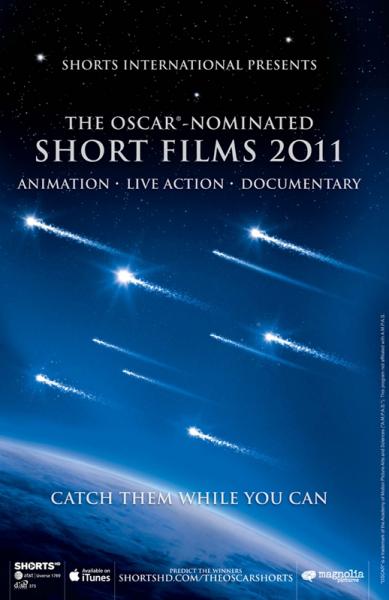Oscar Shorts Can Pack A Punch

Awards for live action and animated shorts are buried deep within the show’s running time and get unfortunately lumped into the prime bathroom break hours, like the Sound Design Oscar or the miserable, inevitable section of modern dance.
Thanks to larger and better outreach from the Oscar shorts PR firms, moviegoers in most big cities can watch the nominated films on the big screen before the telecast. Anyone can download them through iTunes.
Never a full meal, watching them back to back is like a sampling of appetizers. The worst are quickly forgotten and the best are just right.
The animated category is often a repository for bygone or experimental styles. Pixar’s annual spot is “Night and Day” which played before “Toy Story 3.” The title is the story, more or less, and it’s as light, cute and insignificant as you remember. “Madagascar, Carnet de Voyage” by a French studio sails through an African vacation with an array of animation techniques. A 3D pastel effect works beautifully with the scrapbook style of the piece.
Likely favored to win the category is “The Gruffalo” which unsurprisingly is the most traditional. A bevy of high-profile Brits like Helena Bonham Carter and Robbie Coltrain voice a CGI children’s story about a fictitious monster. "The Gruffalo's" tone was whimsical and handsome, but the pacing was all too leisurely.
A curiously odd but engaging choice is “The Lost Thing,” an Australian CGI flick about a beachcomber who finds an unearthly creature. Miyazaki-meets-steam punk is the aim, which intrigues all the way until a disappointingly pat ending.
“Let’s Pollute” mocks our wasteful society in nudge-nudge irony. Its goofy anarchism feels like a long lost bit from “Ren and Stimpy.”
Live action shorts this year vary wildly from the comic to the deadly serious. In a move that must have been unintentional, three of them center on murderous children.
Two young boys wrestle with Catholic guilt in Tanal Toom’s “The Confession.” The film from the UK is well shot and fluidly acted, but the symbolism feels like punishment administered by an ornery nun.
You could argue that “The Crush,” about a schoolboy’s obsession with his teacher, is cut of the same cloth. Irish director and writer Michael Creagh’s picture though is far lighter and perhaps more uncomfortable. Also debatable if the last line, which attempts to resolve the inherent creepiness, is clever or merely a copout.
“Wish 143,” another UK short, could easily be a sex comedy as envisioned by Jodi Piccoult: a boy with terminal cancer uses his Make-a-Wish chance to try and get laid.
Director Ian Barnes avoids the maudlin elements and makes it authentically touching and funny. A world away, in what must be categorized as Belgian guilt film, “Na Wewe” looks at the warring tribes in Burundi, and decides to end on a joke about Hutu sounding like the band U2.
Luke Matheny directed, wrote, and starred in “God of Love” which is pure film school humor, but done right. Cupid reveals himself as a cheesy lounge-singer loser, who throws darts to make people temporarily fall head-over-heels. It may soon be necessary viewing for a hipster Valentine’s Day. Amazingly, just as the joke becomes familiar Matheny rides off into the (black and white) sunset, and we’re left feeling inspired by love’s gracious, and brief, presence.
Reach Tom here.



